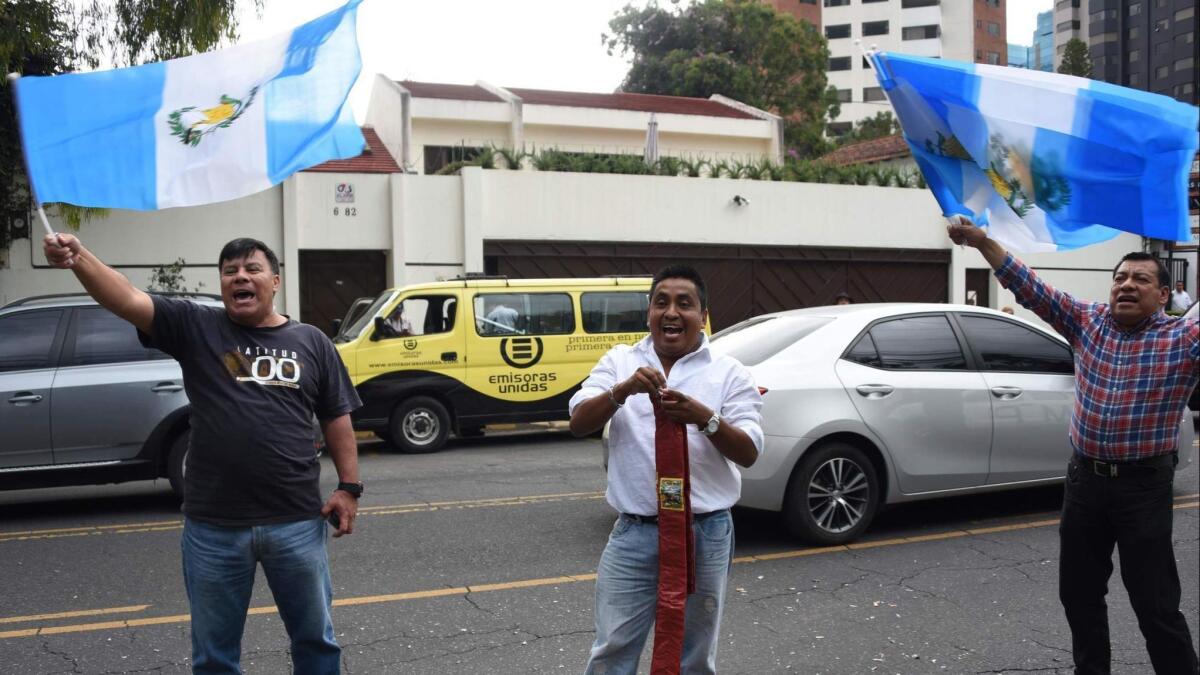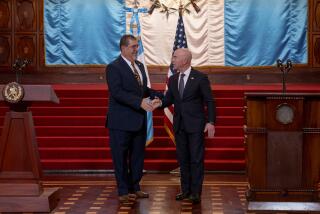Guatemala’s president is dismantling the U.N. anti-corruption group that is investigating him

Reporting from Mexico City — For the last 12 years, a radical experiment has been playing out in Guatemala.
A United Nations-backed commission has investigated hundreds of cases of corruption, drug trafficking and even genocide, probing the misconduct of political leaders, drug lords and others who had long been viewed as above the law.
It has been a radical shift for a country long known for its weak institutions and still scarred by civil war.
The group, known as the International Commission Against Impunity in Guatemala, has been hailed as one of the most effective anti-crime efforts in Latin America, a region where corruption and violence often go unpunished. It has also been criticized as violating Guatemalan sovereignty and failing to stay above the fray of politics.
One of those critics is Guatemalan President Jimmy Morales, who is the target of a commission investigation into illegal campaign financing. Last week he announced plans to end the commission’s mandate, and on Tuesday said its head, Ivan Velasquez, would not be allowed to return to Guatemala from Washington, where he has been meeting with American lawmakers.
Morales’ efforts have drawn widespread condemnation and sparked fears that Guatemala could face a constitutional crisis.
What happens now may affect not only Guatemala’s justice system but also the rest of Central America, where the commission was long held up as a model, and even the flow of migrants and drugs to the United States.
The commission
More than 200,000 people died during Guatemala’s 35-year civil war, which pitted left-wing guerrilla groups against a series of right-wing governments backed by the United States.
A truth commission launched after the war ended in 1996 exposed atrocities committed during the conflict, but Guatemala’s weak justice system meant perpetrators were rarely brought to trial. At the same time, criminal groups operated with abandon, engaging in extortion, kidnappings and drug smuggling. Guatemala’s judicial and political systems were widely believed to be corrupt.
The country was no longer at war but was still beset by one of the highest homicide rates in the world. Immigrants left for the United States in droves.
After appeals from civil society groups, the U.N. stepped in, forming the commission in 2006. It would work with Guatemala’s attorney general’s office to build criminal cases.
The effect was immediate — if controversial.
The commission’s work
The commission has helped jail three ex-presidents, as well as dozens of lawmakers, hit men and drug traffickers.
Its investigation into Otto Perez Molina, whom it accused of running an elaborate corruption scheme after he became president in 2012, sparked massive street protests three years later that forced Perez and his vice president to resign.
Morales was elected president after Perez stepped down. A former television comedian, he ran on an anti-corruption platform, posting the slogan “Ni corrupto, ni ladron”— not corrupt, not a thief — on his campaign billboards.
But Morales turned against the commission after it brought fraud charges against his brother and his son and later began investigating whether Morales accepted about $1 million in illicit campaign funds.
Last year, Morales sought to expel Velasquez, a jurist from Colombia, and pressed for a law that would allow government officials to avoid prison. Anti-corruption advocates, with the help of the U.S. government, foiled those efforts.
But after the commission and Guatemala’s attorney general asked Congress to strip Morales of his immunity from prosecution last month, the president sought once again to get rid of the commission.
His efforts have been buoyed somewhat by criticism of the commission from abroad. After the commission helped prosecute a Russian family that had used false passports obtained from a Guatemalan crime ring, a prominent critic of the Russian government questioned whether it had acted at the behest of Russian President Vladimir Putin. This year, U.S. Sen. Marco Rubio (R-Fla.) announced a hold on $6 million in funding for the commission until questions about the incident were addressed.
The announcement
The optics were startling.
Last Friday, Morales stood flanked by dozens of camouflage-clad soldiers and said that he would not renew the mandate of the U.N.-backed commission.
Outside, armored military vehicles massed in Guatemala City’s main plaza and others circled the commission’s headquarters — scenes that brought back not-so-distant memories of the civil war.
In the days since, Morales has escalated his efforts. Not only has Velasquez been barred from the country, but a spokesman for the commission said Thursday that its employees also have not received expected renewals of their visas.
Guatemalan Foreign Minister Sandra Jovel said Thursday that the commission had overstepped its bounds and become a “clandestine and parallel apparatus” that had begun to resemble the groups it was designed to fight.
International reaction
Criticism from inside and outside Guatemala has been swift.
Guatemalan human rights prosecutor Jordan Rodas called attacks on the commission “a great mistake,” while Human Rights Watch accused Morales of casting his lot “with the forces of corruption and impunity.” A letter signed by 11 nations including Spain, Canada and the United Kingdom implored Morales to reconsider his decision, which it described as “a step backward” for Guatemala and its institutions.
The United States was instrumental in creating the commission and provides about half of its $15-million annual budget.
Though some members of Congress have called for sanctions against Guatemala, with Rep. Norma Torres, a Democrat from Pomona, asking the State Department to withhold U.S. assistance to Guatemala and to block visas and freeze assets of some Guatemalan officials, the Trump administration initially refrained from commenting publicly on the matter.
Some observers speculated that the silence might be tied to Guatemala’s support for President Trump’s controversial decision to move the American Embassy in Israel from Tel Aviv to Jerusalem. Guatemala was one of a handful of countries that also moved their embassies.
But on Thursday, the State Department said Secretary of State Michael R. Pompeo has offered a degree of support for the commission.
State Department spokeswoman Heather Nauert said Pompeo called Morales on Thursday to discuss “the importance of continuing our cooperation in the fight against corruption and impunity and the Guatemalan government’s efforts working with the International Commission Against Impunity in Guatemala.”
Pompeo told Morales that the United States is open to some reforms to the commission, although Nauert did not detail what those would be.
Twitter: @katelinthicum
Twitter: @TracyKWilkinson
More to Read
Sign up for Essential California
The most important California stories and recommendations in your inbox every morning.
You may occasionally receive promotional content from the Los Angeles Times.












